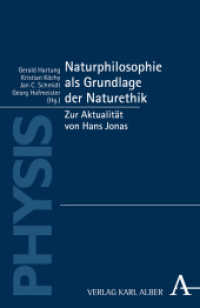Full Description
First published in 2001, Punishment and Sentencing provides a way of introducing principle into sentencing. This is done by bridging the gap between the philosophical justification for punishment and sentencing law and practice. In terms of the interests it deals with, sentencing is the most important area of law. Ironically it is also arguably the least coherent. Nearly three decades ago sentencing was described as a wasteland in the law. Unfortunately, little has changed in that time. Sentencing decisions are often made in accordance with the idiosyncratic sentiments of sentencers, rather than on the basis of binding rules and principles.
Part A of the book provides an overview of current sentencing law and practice. Part B critically examines the main contemporary theories of punishment. Part C discusses the implications that this has for the sentencing process. It is a useful text for students of criminology, law and philosophy courses, as well as a valuable resource for criminal law practitioners.
Contents
Preface Table of Cases Table of Statutes Table of International Instruments Part A 1. Introduction 2. Sentencing Law Overview- The Road to Nowhere Part B 3. Theories of Punishment and the Current State of the Debate 4. The Errors of Retributivism 5. In Defence of a Utilitarian Theory of Punishment: Punishing the Innocent and the Compatibility of Utilitarianism and Rights 6. Incapacitation, Deterrence and Rehabilitation: Flawed Ideals or Appropriate Sentencing Goals? Parts C 7. Proportionality in Sentencing: Its Jurisdiction Meaning and Role 8. Suspended Sentences and Preventive Sentences: Illusory Evils and Disproportionate Punishments 9. New Criminal Sanctions- Inflicting Pain through the Denial of Employment and Education 10. Double Punishment and Punishing Character- The Unfairness of Prior Convictions 11. Consistency and Fairness in Sentencing- The Splendour of Fixed Penalties 12. Conclusion Bibliography Index








